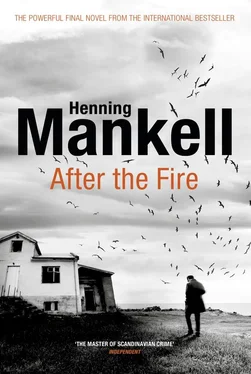‘We can never make sense of death,’ I said. ‘It doesn’t obey any laws or follow any rules. Death is an intractable anarchist.’
She looked curiously at me, not surprisingly. My words sounded peculiar to me as well, even if they were true.
Alexandersson was standing smoking outside the coastguard’s office as I walked towards my boat. When he spotted me, he hurried inside, thinking I hadn’t seen him. Had things really gone so far that no one wanted to talk to me?
I tossed my bags into the boat, cast off and pushed away from the quay before I had even started the engine. I didn’t care if I got wet when I sat down; I just wanted to get away as quickly as possible.
Of course the engine decided to play up. I had almost drifted out of the harbour before it fired. I assumed Alexandersson was standing by a window watching the whole thing. I wondered if he regarded me with contempt or sympathy. I thought he probably saw me as a shady character, someone who had turned out to be a criminal.
I headed for the island. The wind was warm, considering it was a November day. I was about halfway when I slowed right down and let the engine idle.
I realised that Louise had gone. She hadn’t bothered to pack a suitcase, but I knew that when I got back to the caravan I would find that her passport was missing together with her money, her credit cards, everything she needed in order to move on. She had planned this; she had never intended to come to the restaurant. That was why she had given me the car keys; she knew exactly what she was going to do. She had probably caught a bus into town but I had no idea what she had done next, nor where she was going.
She had taken her unborn child with her. Its father was waiting for her somewhere.
I allowed the boat to drift. Her disappearance filled me with disappointment, but there was something else, a feeling, a rapidly growing suspicion.
I remembered when Louise and I had been out on the skerry. How she had brushed against me when she went to pee. When I got home and was on my way up to the caravan, I had discovered that my watch was missing.
The realisation hit me like a hammer blow. Louise had taken my watch. That must have been what happened. I had a daughter who was a skilled pickpocket.
At first I refused to believe it; it was too astonishing, too frightening. But in the end it was impossible to deny the truth. Louise was a pickpocket. She made her living by stealing. There was no other explanation.
She had asked me about my watch in the car simply because she wanted to know if I suspected anything. My answer must have convinced her that I had no idea of the reason behind the disappearance of my watch.
I swore out loud, at Louise and at my own stupidity. I no longer wanted anything to do with her. I didn’t need her, or a grandchild. She had stolen my watch and gone off to some unknown man who was the father of her child.
I moved into the prow of the boat, stretched out my legs and closed my eyes.
I fell asleep, thanks to a combination of weariness and sorrow. I had been dreaming of Harriet when I woke because the engine had cut out. She was standing by the burned-out ruins of my house, and she looked exactly the same as she had done on the day when she made her way across the ice using her wheeled walker. In spite of the fact that it was late autumn in my dream, as in reality, she was dressed for winter, complaining that she was freezing cold. When I embraced her and bade her welcome, she bit me on the arm.
Still half-asleep, I stumbled to the stern and pulled the engine cord. When I got back to the island, I went straight up to the caravan. Louise’s passport, money and various credit cards were gone. At the bottom of her bag I found my watch. I was furious; I hurled it at the wall, but when I picked it up it was still going. I put it on and lay down on the bed. The door of the caravan was ajar; there wasn’t a breath of wind.
‘Louise,’ I said out loud to myself.
Just that. Nothing else. I wasn’t calling to her, I wasn’t pleading with her or begging her to come back. I just said her name.
I decided to row across to my skerry. Settling down with the oars always filled me with a great sense of calm. It didn’t take many strokes before the unease had left me. I rowed with no sense of urgency, resting often. I pictured Louise in different situations: on a bus, on a train, walking into an airport, aboard a ferry. I wondered why she had chosen this particular day to leave. Had I driven her away by asking too many intrusive questions about how she made a living? Or was she unable to cope with the thought of her father being accused of arson?
A pickpocket. Yet at the same time she was helping terminally ill people to see Rembrandt’s paintings for one last time — it didn’t make sense.
I rested on my oars once more. Perhaps she really did believe I’d burned down my house?
I was sweating by the time I reached the skerry. I walked towards the tent, then stopped dead. Someone had been there and hadn’t managed to hide the telltale signs. Not Louise, but someone else.
I had made a fire on a pile of stones; they had been moved, and the pile had grown. I opened the tent and crawled in; my sleeping bag was in the right place, but it was zipped up. I always leave it open during the day to air.
I went back outside. Who had used the tent and lit a fire? I searched the whole skerry for further evidence but found nothing. I returned to the tent and sat down on the rock where I usually balance a plate of food or a cup of coffee on my knees. Was it my imagination? No, I wasn’t wrong. Someone had come to the skerry, rearranged my fire stones and gone inside my tent.
If it had been summer I could have understood it more easily; some kids paddling kayaks might have spent the night there. But in late autumn? It couldn’t be any of the permanent residents of the islands either.
Before I rowed back, I placed a little brown stone shaped like the point of an arrow just beneath the edge of the tent flap. If anyone undid the zip, the stone would move. It was safe from the wind, and no one would suspect that it was a trap.
I made myself something to eat. From time to time I went up the hill and looked over at the skerry through my binoculars, but there was no one there. When I had finished my meal I sat down at the table and turned my attention to one of the crossword books, but I couldn’t concentrate. I tore up the paper grocery bags and tried to make a list of things that had happened over the past few weeks: the fire, the suspicion of arson and, not least, Louise’s pregnancy.
I sat there scribbling until I noticed that I had started drawing grotesque, swollen faces. I screwed up the piece of paper and threw it on the draining board.
I went up the hill one last time. It was too dark to use the binoculars, but I wanted to see if someone had lit a fire by the tent. Nothing.
Once again I wondered who could have been there, and suddenly I remembered the made-up bed in the empty house in Hörum.
I took one of my sleeping tablets and went to bed. The scent of Louise hit me as soon as I put my head on the pillow, bringing me to the verge of tears; I missed her.
I thought about her unborn child; I hoped she had gone to the man who was its father.
Just before the sleeping tablet began to take effect, my parents came into my mind. When I was a child, I once hid underneath the dining table. My parents thought I was asleep. I did it because I thought it would be an exciting adventure, not because I suspected something was going on that might affect me. I sat there looking at their shoes and bare feet. My father, whose legs ached after a long day and evening at the restaurant where he was working, always took off his shoes and socks when he got home — before he had even taken off his hat or coat. It was as if he couldn’t bear to have anything on his feet. After a particularly hard day my mother would prepare a footbath for him, and he would sit there with his feet in a bowl of water while they ate or had a cup of coffee or a glass of wine. My mother, on the other hand, always wore shoes. I can’t recall ever having seen her bare feet during my childhood.
Читать дальше












